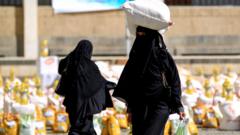The ongoing civil war in Yemen has led to a humanitarian disaster, with aid workers experiencing violence and fear, worsening the lives of millions in need.
**Raids and Arrests: A Crisis for Humanitarian Workers in Yemen**

**Raids and Arrests: A Crisis for Humanitarian Workers in Yemen**
Humanitarian workers in Yemen face increasing risks as arrests rise, undermining aid amid dire conditions.
In Yemen, where nearly half of the population is in dire need of humanitarian assistance, the situation for aid workers has rapidly deteriorated. A recent wave of arrests, including 24 UN staff and local NGO workers by Houthi rebels, has heightened the atmosphere of fear, dramatically affecting the operations of humanitarian organizations.
Hanaa, an employee of a US-funded NGO focused on women's empowerment, recounts her shocking experience when she arrived at her office one day to find her boss detained by armed personnel after a raid that left the workplace in disarray. The organization's resources were seized, and because of these unsettling events, she now fears for her safety and the safety of her colleagues. The civil war spanning over a decade has significantly obstructed humanitarian efforts and left 4.5 million people internally displaced.
With an inability to operate freely, many organizations, including the UN, have been forced to reduce their support, saddling already vulnerable populations with even graver challenges. Yemen has seen severe human rights abuses over the years, with the UN calling for immediate actions against such violations. The recent designation of the Houthis as a terrorist organization has raised alarm among aid workers, who worry it could facilitate further targeting of those connected to US-funded initiatives.
As the situation worsens, families like that of Amal—a mother of nine living in a refugee camp—speak out about the desperate conditions they face without adequate resources. She must choose between begging for food and seeing her children suffer from malnutrition, a heartbreaking decision exacerbated by her husband’s inability to work due to health issues. Amidst this suffering, aid from the World Food Programme barely lasts two weeks in her household, forcing her to face shame and helplessness.
Medical resources are also critically scarce. Clinics across Yemen report empty shelves where medicine should be, highlighting the urgent need for support in a country already listed as one of the least developed globally. Urban areas are plagued by inadequate water and food supplies as most households are unable to meet their basic needs.
International organizations have condemned the detentions of humanitarian staff as violations of human rights, posing a severe threat to the delivery of life-saving aid. Without the continuation of support from international donors, humanitarians like Hanaa risk facing an uphill battle to provide essential services, potentially increasing rates of illiteracy and social collapse in a country already grappling with the remnants of war.
As the humanitarian crisis deepens, the voices of those on the ground become increasingly vital. Hanaa, despite the fear surrounding her work, remains hopeful that they can continue to serve the vulnerable and make a positive impact in the lives of Yemenis during these desperate times.
Hanaa, an employee of a US-funded NGO focused on women's empowerment, recounts her shocking experience when she arrived at her office one day to find her boss detained by armed personnel after a raid that left the workplace in disarray. The organization's resources were seized, and because of these unsettling events, she now fears for her safety and the safety of her colleagues. The civil war spanning over a decade has significantly obstructed humanitarian efforts and left 4.5 million people internally displaced.
With an inability to operate freely, many organizations, including the UN, have been forced to reduce their support, saddling already vulnerable populations with even graver challenges. Yemen has seen severe human rights abuses over the years, with the UN calling for immediate actions against such violations. The recent designation of the Houthis as a terrorist organization has raised alarm among aid workers, who worry it could facilitate further targeting of those connected to US-funded initiatives.
As the situation worsens, families like that of Amal—a mother of nine living in a refugee camp—speak out about the desperate conditions they face without adequate resources. She must choose between begging for food and seeing her children suffer from malnutrition, a heartbreaking decision exacerbated by her husband’s inability to work due to health issues. Amidst this suffering, aid from the World Food Programme barely lasts two weeks in her household, forcing her to face shame and helplessness.
Medical resources are also critically scarce. Clinics across Yemen report empty shelves where medicine should be, highlighting the urgent need for support in a country already listed as one of the least developed globally. Urban areas are plagued by inadequate water and food supplies as most households are unable to meet their basic needs.
International organizations have condemned the detentions of humanitarian staff as violations of human rights, posing a severe threat to the delivery of life-saving aid. Without the continuation of support from international donors, humanitarians like Hanaa risk facing an uphill battle to provide essential services, potentially increasing rates of illiteracy and social collapse in a country already grappling with the remnants of war.
As the humanitarian crisis deepens, the voices of those on the ground become increasingly vital. Hanaa, despite the fear surrounding her work, remains hopeful that they can continue to serve the vulnerable and make a positive impact in the lives of Yemenis during these desperate times.


















